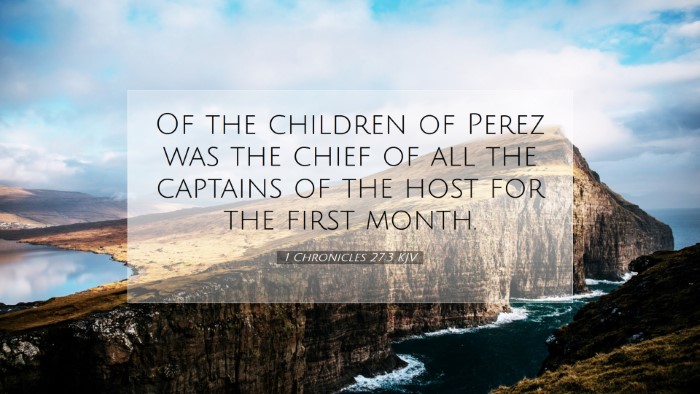Commentary on 1 Chronicles 27:3
Text of the Verse: "Of the children of Perez was the chief of all the captains of the host that month, even Abiezer the son of Zebdiel."
Introduction
The verse 1 Chronicles 27:3 introduces us to the organization of David's military leaders, specifically mentioning Abiezer the son of Zebdiel as the captain for one of the months. This verse is part of a larger narrative detailing the leadership structure in David's administration, highlighting the importance of these leaders in the context of Israel's military and political stability.
Old Testament Context
Understanding the context of the Old Testament is pivotal for grasping this verse's significance. The book of Chronicles, primarily written to returnees from Babylonian exile, aims to reinforce the identity and legacy of Israel and its kings. David’s reign is central, demonstrating God’s faithfulness to His covenant people. This chapter documents David's organizational efforts to consolidate his reign.
Insights from Matthew Henry
Henry notes that the leaders appointed by David were not only military captains but also representatives of Israel’s tribal structure. This verse emphasizes the continuity of lineage, showing that even in military leadership, tribal identity (the children of Perez) is honored. Henry also suggests that leadership in Israel was divinely ordained and reflects God’s providence over His people.
Insights from Albert Barnes
Barnes elaborates on the significance of military organization during David's reign. He points out that Abiezer, being mentioned here, highlights a structured system that allows for accountability and efficiency in military matters. Barnes emphasizes that such careful attention to leadership structure demonstrates a wise and prudent king who relies on capable leaders to maintain the security of the nation.
Insights from Adam Clarke
Clarke focuses on the individual highlighted in this verse. Abiezer, as a representative of the house of Perez, shows the enduring legacy of the tribal leaders. Clarke often underscores the importance of knowing one's heritage, suggesting that Abiezer's leadership reminded the people of God’s work in their history. His leadership role also reflects the value of strong character and commitment within God’s people.
Theological Implications
1 Chronicles 27:3 holds profound theological implications. The mention of Abiezer and the structure of the military leadership illustrate God's sovereign hand in guiding His people, where every leader is placed in their position for a divine purpose. This organization fosters a sense of unity and purpose among the tribes, which echoes the greater narrative of Israel's dependence on God.
Lessons for Leaders Today
- Divine Order: Just as David organized his military under God's guidance, modern leaders are called to seek God’s wisdom in their planning and structure.
- Heritage Matters: Understanding and honoring one’s background can impart identity and purpose to leaders and their communities.
- Accountability: Abiezer's role reminds leaders today of the necessity of accountability and the importance of strong, faithful leadership in maintaining the health of a community.
- Unity in Diversity: Acknowledging and appointing leaders from various tribes emphasizes the beauty of unity in diversity, essential for the body of Christ today.
Conclusion
In summation, 1 Chronicles 27:3 encapsulates crucial themes of leadership, tribal identity, and divine sovereignty. Through the lens of respected commentators like Matthew Henry, Albert Barnes, and Adam Clarke, this verse not only serves as a historical account but also as a rich source of inspiration and instruction for contemporary leaders, pastors, and scholars. The study of this verse encourages the examination of how God orchestrates leadership and the importance of heritage and accountability in fulfilling His purposes for His people.


